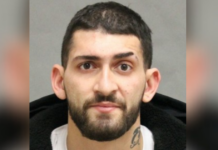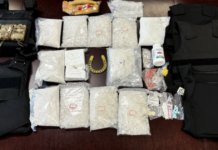The trial of Freedom Convoy organizers Tamara Lich and Chris Barber commenced on Tuesday morning in an Ottawa courthouse. Lich and Barber have been charged with mischief, obstructing police, counselling others to commit mischief and intimidation.
The trial will be held in person only, without the option for proceedings to be viewed virtually.
Crown attorney Tim Radclifee intends to submit over 100 exhibits in the trial, including dozens of videos, photos and letters from the Freedom Convoy protest which took place in February 2022 and lasted for almost three weeks.
Lich and Barber were involved in the original group that organized a convoy of trucks and other vehicles to drive to Ottawa to call for an end to the Covid-19 public health mandates that were in place at the time.
The protest inspired many other demonstrations throughout the country and internationally, until the Liberal government invoked the use of the Emergencies Act, giving police special powers to move in and clear the protest.
It was the first time that the Emergencies Act had ever been used since it was first passed in 1988 and it included the ability to freeze the bank accounts of protesters.
The court will call 22 witnesses throughout the trial including Ottawa’s former mayor, Jim Watson as well as police and other city officials.
Lich and Barber attended with their lawyers in the first row of seats and the courtroom had a crowd of some 50 supporters, lawyers and news reporters, according to National Newswatch.
“We’re trying to put this case on the rails,” said Justice Heather Perkins-McVey, who is presiding over the trial.
Perkins-McVey requested the largest courtroom in the Ontario court of justice in order to allow as many people as possible to watch the trial, as it is of high public interest.
A small crowd of supporters holding signs welcomed Lich outside the courthouse as she entered the building.
Lich and Barber were both arrested on the evening that the Trudeau government declared a national emergency under Emergencies Act, which approved special powers for police to make the arrests and begin forcibly removing protesters from the street.
Barber was immediately released on bail however Lich remained in jail for a total of 49 days before being granted bail.





















